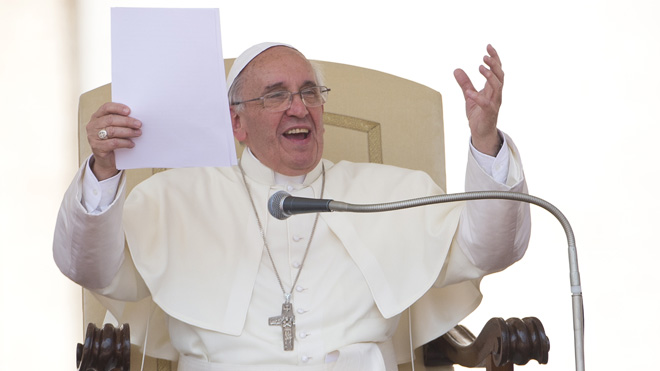 I remember the first time I read a papal letter. I was a junior in college, and I had recently taken a job as a campus minister. The new, young, exciting pope, John Paul II, had just issued his first encyclical. There was no Internet in 1979 (well, there was, but only computer geeks and PhD grad students knew about it). I had to go to a Catholic bookstore and buy a copy. I was sitting in the back of a car, on the way to a retreat, trying to understand the pope’s message on the “Redemption of Man.” It was a tough read. For example, here is key passage:
I remember the first time I read a papal letter. I was a junior in college, and I had recently taken a job as a campus minister. The new, young, exciting pope, John Paul II, had just issued his first encyclical. There was no Internet in 1979 (well, there was, but only computer geeks and PhD grad students knew about it). I had to go to a Catholic bookstore and buy a copy. I was sitting in the back of a car, on the way to a retreat, trying to understand the pope’s message on the “Redemption of Man.” It was a tough read. For example, here is key passage:
When we penetrate by means of the continually and rapidly increasing experience of the human family into the mystery of Jesus Christ, we understand with greater clarity that there is at the basis of all these ways that the Church of our time must follow, in accordance with the wisdom of Pope Paul VI, one single way: it is the way that has stood the test of centuries and it is also the way of the future. (13)
That is a single sentence. And it appears about 12 pages in. And I had to reread it several times to understand it.
A few days ago, Pope Francis issued his first apostolic exhortation, “The Joy of the Gospel.” Here is the first thing he says:
The joy of the gospel fills the hearts and lives of all who encounter Jesus. Those who accept his offer of salvation are set free from sin, sorrow, inner emptiness and loneliness. With Christ joy is constantly born anew. In this Exhortation I wish to encourage the Christian faithful to embark upon a new chapter of evangelization marked by this joy, while pointing out new paths for the Church’s journey in years to come. (1)
I got that. I got it the first time I read it. I keep rereading it, not because I don’t understand, but because I’m amazed.
The two popes are saying essentially the same thing, and I don’t intend this comparison to be a writing lesson. I point out the difference in case you have, in the past, avoided diving into papal letters because…well, you have a life.
If you are an RCIA team member, and you truly want to form seekers in a life of Christian joy, you really need to read Pope Francis’ letter. It will change the way you do initiation ministry.
Here are five key things every RCIA team member can learn from this apostolic exhortation.
1. Don’t be a sourpuss
Seriously, he says that! “One of the more serious temptations which stifles boldness and zeal is a defeatism which turns us into querulous and disillusioned pessimists, ‘sourpusses’” (85). The pope also says that we “must never look like someone who has just come back from a funeral! Let us recover and deepen our enthusiasm, that ‘delightful and comforting joy of evangelizing’” (10).
2. Talk to people who don’t know Jesus
If we are honest, almost all the people in our RCIA processes already know Jesus. We do a great job helping people deepen their relationship to Jesus. That is a very good thing. But it should not be the first thing. Pope Francis says: “We cannot forget that evangelization is first and foremost about preaching the Gospel to those who do not know Jesus Christ or who have always rejected him” (14). As we begin this new liturgical year, perhaps we can make a resolution to revise what we do as RCIA teams so we are more diligently reaching out to those who need to hear the gospel for the very first time.
3. Be patient
Initiation ministry is messy. If you are like me, you don’t like messy. I hate messy. I want people to show up on time, give some sign of making progress, and would it hurt to show a little gratitude? Pope Francis nails me on this. He says that yes, Christian ministry is joyful. But it is also Cross-full. Sometimes we have to bear the cross of people’s messy lives and recognize that the Holy Spirit is working in the midst of the mess. We cannot give in to “the temptation to separate, before its time, the wheat from the weeds; it is the fruit of an anxious and self-centered lack of trust” (85). He also says: “Evangelization consists mostly of patience and disregard for constraints of time” (24).
4. We don’t have to teach everything all at once
This should be obvious, but if the pope thought it was important enough to put in his first apostolic exhortation, you gotta wonder. Think of it this way. If you have a child, you want to teach the child not to run out into traffic. You also want to teach him not to fight with his sister. And you want to teach him not to leave his shoes in the living room. Now, of all those “truths,” what is first and most important on your teaching list?
Pope Francis reminds us that there is a “hierarchy of truths.” He also reminds us of what is first on the teaching list: “What counts above all else is ‘faith working through love’.” And right there next to faith and love is mercy. He quotes Aquinas: “Thomas thus explains that, as far as external works are concerned, mercy is the greatest of all the virtues: ‘In itself mercy is the greatest of the virtues, since all the others revolve around it and, more than this, it makes up for their deficiencies’” (37).
5. Go out to the poor
This is a tough one. Pope Francis isn’t just talking about volunteering at the soup kitchen or donating a turkey at Thanksgiving. He says we have created an entire economy that treats human beings like “consumer goods to be used and then discarded.” He goes on to say:
We have created a “disposable” culture which is now spreading. It is no longer simply about exploitation and oppression, but something new. Exclusion ultimately has to do with what it means to be a part of the society in which we live; those excluded are no longer society’s underside or its fringes or its disenfranchised — they are no longer even a part of it. The excluded are not the “exploited” but the outcast, the “leftovers.” (53).
I don’t know how to solve this. I don’t know what RCIA teams need to do about it. But it seems central to what we do. If we are the ones who bring “good news” to the world, it seem to me that we have to find a way to make the news “good” for those who are outcast. I’ll be praying about this, and examining my own life. Perhaps a first step for all of us might be to read and reread Pope Francis’ letter prayerfully and carefully this Advent. (You can find a copy here.)
Here is one thing I do know. The pope is one man. An important man, chosen by the Holy Spirit, and successor to St. Peter. But still just one man. He can exhort and urge and lead, but he cannot do. Not all by himself. We have to go out into the world and be the face of Christ for those most in need of Christ. If we don’t or won’t, the pope’s powerful message won’t really have been very powerful at all.
At the end of his letter, Pope Francis turns to the Blessed Virgin with a plea that might become a mantra for all of us:
Mother of the living Gospel,
wellspring of happiness for God’s little ones,
pray for us.
Amen.

















I’m loving this series of your culling this amazing document!
He comes…
Thanks Lynn!